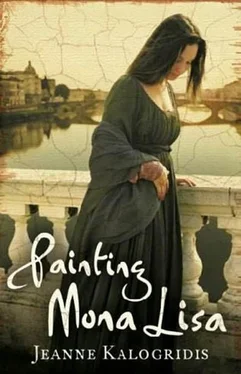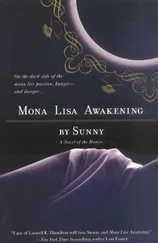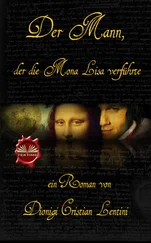Even as he spoke, he felt his argument fail. Lorenzo’s eyes were filled with a peculiar light-furious and fierce, verging on madness-a light that made Giuliano think his brother was capable of malevolence. He had seen such a look in Lorenzo’s eyes only rarely-never before had it been directed at him-and it chilled him.
“You’ll do what? Refuse to marry anyone at all?” Lorenzo shook his head vehemently; his voice grew louder. “You have a duty, an obligation to your family. You think you can go to Rome on a whim, pass our blood on to a litter of bastards? You would stain us with excommunication? Because that’s what would happen, you know-to both of you! Sixtus is in no mood to be generous to us.”
Giuliano said nothing; the flesh on his cheeks and neck burned. He had expected no less, though he had hoped for more.
Lorenzo continued; the hand that had reached for his brother now became a jabbing, accusatory finger. “Do you have any idea of what will happen to Anna ? What people will call her? She’s a decent woman, a good woman. Do you really want to ruin her? You’ll take her to Rome and grow tired of her. You’ll want to come home to Florence. And what will she have left?”
Angry words scalded Giuliano’s tongue. He wanted to say that although Lorenzo had married a harridan, he, Giuliano, would rather die than live in such loveless misery, that he would never stoop to fathering children upon a woman he despised. But he remained silent; he was unhappy enough. There was no point in making Lorenzo suffer the truth, too.
Lorenzo emitted a growl of disgust. “You’ll never do it. You’ll come to your senses.”
Giuliano looked at him a long moment. “I love you, Lorenzo,” he said quietly. “But I am going.” He turned and moved to the door.
“Leave with her,” his brother threatened, “and you can forget that I am your brother. Don’t imagine I am joking, Giuliano. I’ll have nothing more to do with you. Leave with her, and you’ll never see me again.”
Giuliano looked back over his shoulder at Lorenzo and was suddenly afraid. He and his older brother did not joke with each other when they discussed important matters-and neither could be swayed when he had made up his mind. “Please don’t make me choose.”
Lorenzo’s jaw was set, his gaze cold. “You’ll have to.”
Later, in the evening, Giuliano had waited in Lorenzo’s ground-floor apartment until it was time to meet Anna. He had spent the entire day contemplating Lorenzo’s comment about how she would be ruined if she went to Rome. For the first time, he permitted himself to consider what Anna’s life would be like if the Pope refused to grant an annulment.
She would know disgrace and censure; she would be forced to give up her family, her friends, her native city. Her children would be called bastards and be denied their inheritance as Medici heirs.
He had been selfish. He had been thinking only of himself when he made the offer to Anna. He had spoken too easily of the annulment, in hopes that it would sway her to go with him. And he had not, until that moment, considered that she might reject his offer; the possibility had seemed too painful to contemplate.
Now he realized that it would save him from making an agonizing choice.
But when he went to meet her at the door and saw her face in the dying light, he saw that his choice had been long ago made, at the moment when he gave his heart to Anna. Her eyes, her skin, her face and limbs exuded joy; even in the shadowy dusk, she shone. Her movements, which had once been slow, weighed down by unhappy consequence, were now agile and light. The exuberant tilt of her head as she looked up at him, the faint smile that bloomed on her lips, the swift grace with which she lifted her skirts and rushed to him, relayed her answer more clearly than words.
Her presence breathed such hope into him that he moved quickly to her and held her, and let it infuse him. In that instant, Giuliano realized that he could refuse her nothing, that neither of them could escape the turning of the wheel now set in motion. And the tears that threatened him did not spring from joy; they were tears of grief, for Lorenzo.
He and Anna remained together less than an hour; they spoke little-only enough for Giuliano to convey a time, and a place. No other exchange was needed.
And when she was gone again-taking the light and Giuliano’s confidence with her-he went back to his own chamber and called for wine. He drank it sitting on his bed and recalled, with exquisite clarity, an incident from childhood.
…
At age six, he had gone with Lorenzo and two of his older sisters, Nannina and Bianca, for a picnic on the shores of the Arno. Attended by a Circassian slave woman, they had traveled by carriage across the Ponte Vecchio, the bridge built a millennium before by the Romans. Nannina had been captivated by the goldsmiths’ shops that lined the bridge; soon to be married, she was already interested in womanly things.
Lorenzo had been restless and glum. He had just begun to take on the Medici responsibilities; the year before, he had begun receiving letters asking for his patronage, and their father, Piero, had already sent his eldest son to Milan and Rome on politically motivated trips. He was a homely boy, with wide-set slanting eyes, a jutting jaw, and soft brown hair that fell in a neatly trimmed fringe across a pale, low forehead; yet the sensitive intelligence that shone in those eyes made him oddly attractive.
They made their way to the pastoral neighborhood of Santo Spirito. Giuliano recalled tall trees, and a sweeping grass lawn that sloped down to the placid river. There, the slave woman set a linen cloth on the ground and brought out food for the children. It was late spring, warm with a few lazy clouds, though the day before it had rained. The river Arno was quicksilver when the sun struck it, leaden when it did not.
Lorenzo’s sullenness that day made Giuliano sad. It seemed to him that their father was too intent on making Lorenzo an adult before his time. So, to make him laugh, Giuliano had run down to the riverbank, gleefully ignoring the slave’s outraged threats, and stomped, splashing, into the water fully clothed.
His antics worked; Lorenzo followed, laughing, tunic, mantle, slippers, and all. By this time, Nannina, Bianca, and the slave were all shouting their disapproval. Lorenzo ignored them. He was a strong swimmer, and soon made his way quite a distance from the shore, then dove beneath the waters.
Giuliano followed tentatively but, being younger, fell behind. He watched as Lorenzo took a great gulp of air and disappeared beneath the gray surface. When he did not reappear immediately, Giuliano treaded water and laughed, expecting his brother to swim beneath him and grasp his foot at any moment.
Seconds passed. Giuliano’s laughter turned to silence, then fear-then he began to call for his brother. On the shore, the women-unable to enter the water because of their heavy skirts-began to cry out in panic.
Giuliano was only a child. He had not yet overcome his fear of diving beneath the water, yet love for his brother drove him to suck in a deep breath and submerge himself. The silence there astonished him; he opened his eyes and peered in the direction where Lorenzo had been.
The river was muddy from the previous day’s rains; Giuliano’s eyes stung as he searched. He could see nothing but a large, irregular dark shape some distance away, deep beneath the waters. It was not human-not Lorenzo-but it was all that was visible, and instinct told him to approach it. He surfaced, drew in more air, then compelled himself to dive down again.
There, the length of three tall men beneath the surface, lay the craggy limbs of a fallen tree.
Giuliano’s lungs burned, yet his sense that Lorenzo was nearby made him push against the quiet water. With a final, painful burst, he reached the sunken branches and pressed a palm against the slick surface of the trunk.
Читать дальше
Конец ознакомительного отрывка
Купить книгу












